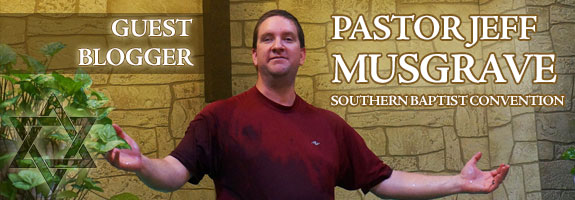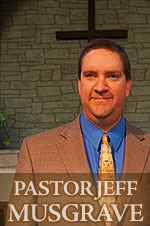A Southern Baptist Pastor's Hebraic Journey
Series:

This is the first of a series of blogs by guest writers we hope to share. It's merely a way to hear people's testimony, their spiritual journey in relationship to the truths of Scripture as revealed when they began studying from a Hebraic perspective. Some will also share the impact of Emet HaTorah on their lives. Today, I introduce you to Pastor Jeff Musgrave. Jeff is a Southern Baptist minister and pastors First Baptist Church in Langdon, North Dakota. Jeff and I have gotten to know one another over the last few years and he recently helped me in the proofing process of my new book, The Four Responsibilities of a Disciple. Here's Jeff's story of how he came to know Jesus as Yeshua and how that has affected his life and ministry.
-Darren
 My journey into a Hebraic understanding of faith in our Master Yeshua has been an interesting and winding path that started around seven or eight years ago. I grew up in church, specifically a Southern Baptist Church(SBC) in the western part of Arkansas (where SBC churches are as plentiful as the Lutheran churches that dot my current location). I confessed faith in Jesus at an early age, but it was largely a playing up to expectations on my part as I knew how to say all of the right things and even appear to do the right things to a large degree. Discipleship at my home church was primarily done with Bible drills and some Scripture memorization. Not bad things, but looking back on it, I can sense that part of the issue was my own heart as well. I was playing a part without a commitment to the requirements of the role.
My journey into a Hebraic understanding of faith in our Master Yeshua has been an interesting and winding path that started around seven or eight years ago. I grew up in church, specifically a Southern Baptist Church(SBC) in the western part of Arkansas (where SBC churches are as plentiful as the Lutheran churches that dot my current location). I confessed faith in Jesus at an early age, but it was largely a playing up to expectations on my part as I knew how to say all of the right things and even appear to do the right things to a large degree. Discipleship at my home church was primarily done with Bible drills and some Scripture memorization. Not bad things, but looking back on it, I can sense that part of the issue was my own heart as well. I was playing a part without a commitment to the requirements of the role.
After my senior year in high school was over, I committed my life to follow Jesus wherever that might take me; and beginning in my freshman year of college, I spent a great deal of time with guys who encouraged me in my walk with the Master. I devoted my life to ministry in response to a sense of calling that God had placed on me in those early years of college and served as a youth minister in a few smaller churches in rural towns in Arkansas, but God had other plans for me. Through a series of events that would merit it's own post, we found our family moving to western South Dakota in 2003 to serve in a church in Rapid City. During that time, I found a job working in a call center in Rapid City, SD and it is at that call center that God brought me into contact with a man who has had a lasting impact on my walk with Yeshua, even after I moved away to North Dakota.
Eric had a knack for leaving me asking for more information any time we talked about matters of faith. I didn't get the chance to really quiz him a lot about these things until my final year of work there, when I joined his department and started to spend more time with him on a daily basis. I became aware of the fact that although he and his family were committed followers of Yeshua, they didn't do a lot of things that most Christians that I knew did (like celebrate Christmas among other things). This intrigued me, and as I asked him questions about his beliefs and theology, he would often respond with somewhat confusing answers (at the time anyway) and leave me room to discover more on my own. I still remember the day that I called him after finding Hanukkah referenced in the footnote of my old NIV Bible (which I had checked after reading the Complete Jewish Bible translation of John 10) with a somewhat sheepish apology for being slow of understanding about what he had told me regarding the festival. At this point, I started doing more searching on my own for those things that had been "hidden in plain sight" as I had studied the Scriptures. A very helpful Messianic pastor from out west actually sent me an entire set of Torah Club 4 (the old ones) as a response to my correspondence and questions to him via email and I was introduced to the fine scholarship of First Fruits of Zion for the first time.
I also found some of the less than helpful streams of Messianic thought early on in my searching and studies, and entered what I now refer to as my "cage-phase stage" of Messianic practice. I borrowed the term from a SBC turn of phrase that I have often heard used to describe Calvinists who make a habit of overwhelming everyone they see/speak to with the tenets of Calvinism in an effort to "illuminate" the other person's thinking and theology. I could be a little (or a lot) intense and overwhelm people with the things I was discovering. Frankly, I felt like someone had been hiding some awesome treasures from me and I wanted everyone to see them. And in a sense, that may well be true; but I have also learned that people learn best through discovery. Had I taken the time to slow down and take a few deep breaths, I might have caught earlier the wisdom that the folks at FFOZ have been careful to share in various ways. The path of Torah is an invitation to walk the ancient paths that should not be forced (or force fed) to others as much as it should be shown to those we know. Frankly, it is surprising that I didn't get kicked out of the pulpit in my current church or disavowed by folks in some of the SBC spheres in which I ran during this time in my walk. I have found that the Hebraic perspective of studying the Scriptures has opened new vistas to me and has made my walk of faith exciting and vibrant in ways that I couldn't have imagined; and the desire to try and give that to others can be overwhelming at times. I have discovered through experience however, that we cannot give that which is not ready to be received. I am always excited to share what I can with those who show interest and "ears that will hear" the amazing insights that come from digging in to the Scriptures with a mind that sees through the lens of Hebraic thought.
Sometime during these studies a few years back, I stumbled onto a link or two to Darren's old site, Digging with Darren, for some archaeology articles as I remember. I didn't realize at that time that I had another connection to Darren from my past (I graduated from HS with his brother), but I bookmarked the site and added it to the blogroll at my own blog for further reading. The first post that I remember distinctly was a post regarding the Hebrew word anavah. That post touched off a year-long pursuit of how that concept fit into my walk as a disciple and my calling as a pastor of a small SBC church in an out-of-the-way corner of North Dakota. As Darren began posting more material focused on discipleship, it really struck a chord with me. As I mentioned at the outset, I have been a big proponent of making discipleship a more intentional and focused part of our mission and ministry as a church. As these posts continued, I contacted Darren and eventually even got a little more involved by providing some feedback a couple of times. I have appreciated the insights that he has pulled together and some of the practical ways he has outlined for being a disciple and making more disciples. I count it a joy to have been even a small part of seeing the recent booklet on discipleship become a reality. It has been a blessing to me already and I have used a couple of the statements from the book in recent sermons at my church.
Speaking of which, that brings me to the last area that Darren had asked me to mention: how working and teaching from a Hebraic perspective has affected my ministry as a SBC pastor. I would be the first to say (in fact I more or less said it above) that the way in which these truths are communicated has a profound effect on how they are received. I have found push back and sometimes hostility or scorn when I have tried to share where I am on the journey with others in my denomination. As a pastor, I have managed to cause needless offense in my own church (hello cage-phase), although they were gracious to confront the issue and me and we managed to work through those things together and I have found that circumspection and a little more seasoning has helped me to communicate my points better most of the time. I have been accused on an SBC blog of promoting "works salvation" on a couple of occasions as well. But amidst it all, I have been blessed and challenged in my journey and feel compelled by God to stay where He has planted me and continue on my journey with those He has brought into my life and ministry. I am thankful to those who have committed to sharing the Hebraic perspective with a broader audience and who have spoken many of these truths into my life, while also opening horizons of study that have allowed me a fresh perspective and a renewal of faith. Thanks for allowing me to share a little bit of my journey with you. Blessings to you through our Lord and Master, Yeshua Ha Mashiach.








